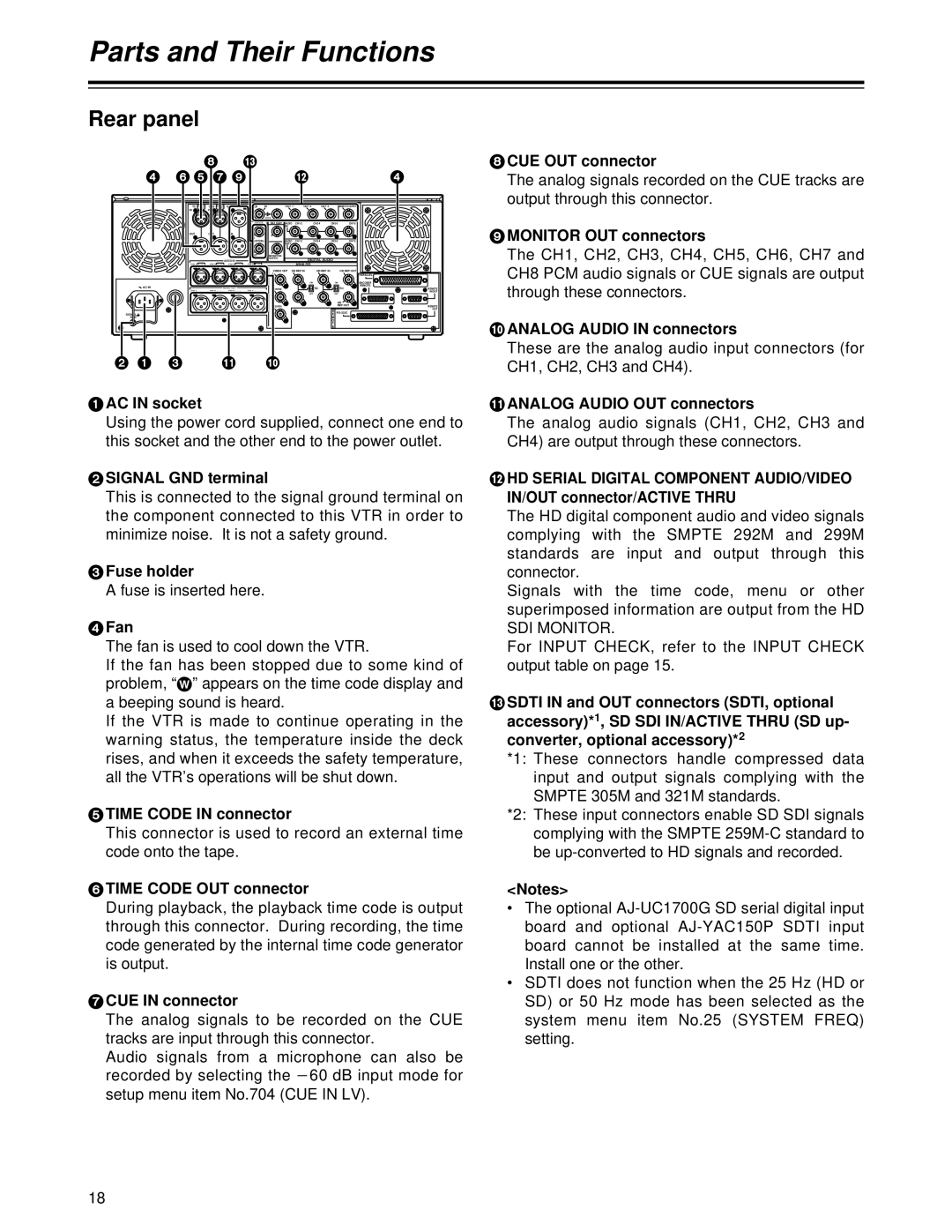
Parts and Their Functions
Rear panel
8=
4 | 6 5 7 9 |
|
| < |
|
| 4 | |||||
| TC | PUSH | CUE | PUSH | MON | HD SDI | IN | OUT 1 | OUT 2 | OUT 3 |
| MONITOR (SUPER) |
| IN |
| IN |
| L |
|
|
|
|
|
|
|
|
|
|
|
|
|
| ACTIVE |
|
|
|
|
|
|
|
|
|
|
|
| THROUGH |
|
|
|
|
|
|
|
|
|
|
| SDTI | SD SDI | AUDIO | CH1·2 | CH3·4 | CH5·6 | CH7·8 |
|
|
|
|
|
|
|
| IN |
|
|
|
|
| OUT |
| OUT |
| R |
|
|
|
|
|
|
|
|
|
|
|
|
| IN |
|
| CH1·2 | CH3·4 | CH5·6 | CH7·8 |
|
|
|
|
|
| (OPTION) |
| AUDIO | ||||
|
|
|
|
|
|
|
| OUT |
|
|
|
|
|
|
|
|
|
| OUT | MONITOR |
|
|
|
|
|
|
|
|
|
| AUDIO IN |
| (SUPER) |
| DIGITAL AUDIO |
|
| |
| CH 1 | PUSH |
| PUSH | PUSH |
|
|
|
| |||
| CH 2 | PUSH |
|
| ANALOG |
|
|
| ||||
|
|
|
| CH 3 | CH 4 |
|
|
|
|
|
| |
|
|
|
|
|
|
| VIDEO OUT |
| SD REF IN | HD REF IN | HD REF OUT | |
|
|
|
|
|
|
| 1 |
|
|
|
| PARALLEL |
|
|
| ON |
| ON | ENCODER |
AC IN | AUDIO OUT |
|
| 75≠ | 75≠ | REMOTE |
| 2(WFM) | REMOTE | ||||
CH 1 | CH 2 PUSH CH 3 PUSH | CH 4 PUSH | OFF |
| OFF | IN/OUT |
|
|
| SD |
|
| 3(SUPER) |
| REF OUT | REMOTE |
|
| R |
| OUT |
SIGN | L |
| ||
E |
|
| ||
G | D | M |
|
|
|
| O |
|
|
|
| T |
|
|
|
| E |
|
|
2 1 3 ; :
1AC IN socket
Using the power cord supplied, connect one end to this socket and the other end to the power outlet.
2SIGNAL GND terminal
This is connected to the signal ground terminal on the component connected to this VTR in order to minimize noise. It is not a safety ground.
3Fuse holder
A fuse is inserted here.
4Fan
The fan is used to cool down the VTR.
If the fan has been stopped due to some kind of problem, “ W” appears on the time code display and a beeping sound is heard.
If the VTR is made to continue operating in the warning status, the temperature inside the deck rises, and when it exceeds the safety temperature,
all the VTR’s operations will be shut down.
5TIME CODE IN connector
This connector is used to record an external time code onto the tape.
6TIME CODE OUT connector
During playback, the playback time code is output through this connector. During recording, the time code generated by the internal time code generator is output.
7CUE IN connector
The analog signals to be recorded on the CUE tracks are input through this connector.
Audio signals from a microphone can also be
recorded by selecting the | j60 dB input mode for |
setup menu item No.704 (CUE IN LV). |
|
8CUE OUT connector
The analog signals recorded on the CUE tracks are output through this connector.
9MONITOR OUT connectors
The CH1, CH2, CH3, CH4, CH5, CH6, CH7 and CH8 PCM audio signals or CUE signals are output through these connectors.
:ANALOG AUDIO IN connectors
These are the analog audio input connectors (for CH1, CH2, CH3 and CH4).
;ANALOG AUDIO OUT connectors
The analog audio signals (CH1, CH2, CH3 and CH4) are output through these connectors.
<HD SERIAL DIGITAL COMPONENT AUDIO/VIDEO IN/OUT connector/ACTIVE THRU
The HD digital component audio and video signals complying with the SMPTE 292M and 299M standards are input and output through this connector.
Signals with the time code, menu or other superimposed information are output from the HD SDI MONITOR.
For INPUT CHECK, refer to the INPUT CHECK output table on page 15.
=SDTI IN and OUT connectors (SDTI, optional
accessory)* | 1, SD SDI IN/ACTIVE THRU (SD up- | ||||
converter, optional accessory)* |
| 2 | |||
*1: These connectors | handle | compressed | data |
| |
input and | output | signals | complying | with | the |
SMPTE 305M and 321M standards.
*2: These input connectors enable SD SDI signals complying with the SMPTE
<Notes>
•The optional
•SDTI does not function when the 25 Hz (HD or SD) or 50 Hz mode has been selected as the system menu item No.25 (SYSTEM FREQ) setting.
18
